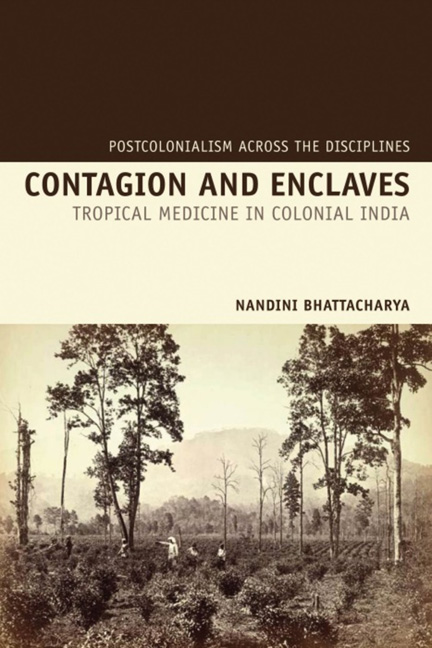Book contents
- Frontmatter
- Dedication
- Contents
- List of Illustrations
- List of Tables
- Acknowledgements
- List of Abbreviations
- 1 Disease and Colonial Enclaves
- 2 The Sanatorium of Darjeeling: European Health in a Tropical Enclave
- 3 Pioneering Years in Plantation and Medicine in Darjeeling, Terai and Duars
- 4 The Sanatorium Enclave: Climate and Class in Colonial Darjeeling
- 5 Contending Visions of Health Care in the Plantation Enclaves
- 6 The Plantation Enclave, the Colonial State and Labour Health Care
- 7 Tropical Medicine in Its ‘Field’: Malaria, Hookworm and the Rhetoric of the ‘Local’
- 8 Habitation and Health in Colonial Enclaves: The Hill-station and the Tea Plantations
- Bibliography
- Index
4 - The Sanatorium Enclave: Climate and Class in Colonial Darjeeling
- Frontmatter
- Dedication
- Contents
- List of Illustrations
- List of Tables
- Acknowledgements
- List of Abbreviations
- 1 Disease and Colonial Enclaves
- 2 The Sanatorium of Darjeeling: European Health in a Tropical Enclave
- 3 Pioneering Years in Plantation and Medicine in Darjeeling, Terai and Duars
- 4 The Sanatorium Enclave: Climate and Class in Colonial Darjeeling
- 5 Contending Visions of Health Care in the Plantation Enclaves
- 6 The Plantation Enclave, the Colonial State and Labour Health Care
- 7 Tropical Medicine in Its ‘Field’: Malaria, Hookworm and the Rhetoric of the ‘Local’
- 8 Habitation and Health in Colonial Enclaves: The Hill-station and the Tea Plantations
- Bibliography
- Index
Summary
As we have seen in Chapter 2, Darjeeling was incorporated into the wider colonial polity and economy of north Bengal over the nineteenth century. Meanwhile, it also sustained its role as a resort for exclusive European medicalized leisure in the late Victorian period. As its popularity became wider, the town stretched to accommodate various demands on its multiple identities – as a European social enclave and seasonal administrative centre, as the social and medical hub for the planters of the Darjeeling, Duars and Terai. As they did over many other institutions of British privilege, the Indian elite, especially the Bengalis, staked a claim on Darjeeling. With these multiple claims over its privileges and facilities, there was also a sense of loss of Darjeeling's essential character. After the turn of the century, both British and Indian complaints echoed official discourse in an attempt to keep Darjeeling socially exclusive. Most of the other principal hill-stations felt the pressures of over-crowding and the consequent spread of diseases within the town. Kennedy argues that the incursions of Indians, ‘the Intrusion of the Other’, at various levels strained the resources of the hill-stations and changed their essential character. I will contend here that this sense of ‘intrusion’ was a matter of perception both by the British and the Indian elites. Despite a real growth in its population at the turn of the century, Darjeeling remained an exclusive social and cultural space. In official reports and elite perception, it was the poorer sections within the town which acquired visibility as the undesirable ‘crowd’ in the late colonial period. From the turn of the century, the municipal government and the elite in Darjeeling sought to limit the short-term visits by middle-class Bengalis as well as economic migration by casual labourers to the town through various means. It was also because of this perception of loss that the administration and municipality of Darjeeling strove to retain the privileged and exclusive urban space that replicated the structural municipal benefits enjoyed by civil stations, such as well-maintained roads, sewerage, electric lighting and generous government grants to maintain the facilities. This was facilitated by its particular privileged position in municipal governance and grants-in-aid from provincial government in the interwar years. This municipal privilege that Darjeeling enjoyed was a reflection of the attempts to keep the town a European enclave.
- Type
- Chapter
- Information
- Contagion and EnclavesTropical Medicine in Colonial India, pp. 84 - 98Publisher: Liverpool University PressPrint publication year: 2012



